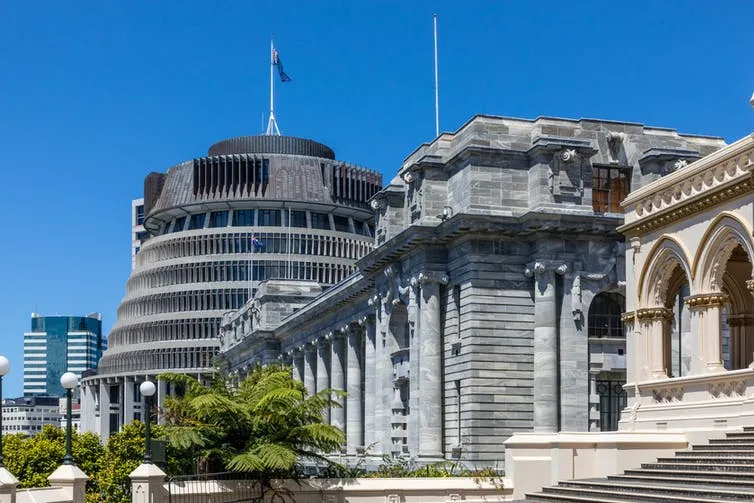Table of Contents
Bryce Edwards
Victoria University of Wellington – Te Herenga Waka
democracyproject.nz
Dr Bryce Edwards is Political Analyst in Residence at Victoria University of Wellington. He is the director of the Democracy Project.
This Government has a problem with urgency. Critics from both left and right have long complained about their lack of urgency on issues such as climate change, housing, and inequality.
Likewise, in terms of the Covid response, there’s been a chorus of criticism that Labour has been complacent and sluggish on key elements of New Zealand’s pandemic plan. From the very late vaccination rollout – which critics say led to the need for the lockdown, costing $10bn – through to equipping the health system, issues around MIQ, the border, contact tracing, and saliva testing.
Yet on some aspects of governing they have displayed extreme haste – rushing legislation through under parliamentary urgency. Such speed might be seen by the Government’s supporters as partially making up for the lack of action in other areas. But without proper debate, consultation and evaluation, such rushed lawmaking invariably leads to poor policy and democratic deficits that harm us all.
Rushing through the Traffic Lights
Yesterday in Parliament the Government railroaded its “traffic light” and vaccine mandate bill through the third and final reading. The legislation is officially named “The Covid-19 Response (Vaccinations) Legislation Bill”, and it comes into effect next week. The legislation sets out how businesses and individuals can operate under the new Covid regime that will replace the current alert levels. It will have a huge impact on the rights and lives of the public over summer and potentially further into the future – especially determining who can participate and work in other activities. As such, it deals with some extremely important and fraught aspects of Covid management.
Herald political editor Claire Trevett has explained today what this means:
“a law change that is estimated to result in vaccine mandates over 40 per cent of the country’s workforce will be pushed through this week under urgency, without any space for public submissions and without time for select committees to knuckle out any fishhooks or flaws. Even the Ministry of Justice did not get time to vet it properly”
– see: Government rams through ‘no jab, no job’ law at its peril (paywalled).
So, is the legislation so straightforward and uncontroversial that urgency can be justified, given that there has been no real chance for public scrutiny of the details?
The Minister pushing it through, Chris Hipkins (who also happens to be the Minister for Open Government) says this about the bill’s process:
“It is quite a significant piece of legislation, and it’s quite a technical piece of legislation, and so that takes some time to work through”.
Many commentators have pointed out that Hipkins’ justification is an own goal that actually underlines how much more scrutiny this particular legislation requires. And few seem to believe there wasn’t time for at least a brief select committee process, even if this meant bringing Parliament back into session next week (when a recess is scheduled).
The Government, on the other hand, is claiming that consultation has occurred, especially behind the scenes with iwi, unions, and business.
Condemnation of the Government’s Process
Legal academics have been particularly aggrieved by the Government’s seemingly unnecessary haste. Writing for the Spinoff yesterday, Andrew Geddis of the Otago Law School says the legislation is too important to be dealt with like this:
“A bill that allows the state to say ‘put this in your body or else largely forgo social interactions’ should be given time for proper scrutiny and debate”
– see: In rushing through the ‘traffic light’ legislation, the government has failed us.
Likewise, Victoria University of Wellington law professor Dean Knight has come out swinging, labelling Labour’s latest manoeuvre a “constitutional disgrace”. He has explained that “Legislative change seriously implicating rights like this needs much more time to breathe, to be interrogated and for its legitimacy to be built through dialogue.”
Chief Human Rights Commissioner Paul Hunt has stated that the process is “highly problematic both constitutionally and in terms of the state’s human rights and Te Tiriti o Waitangi obligations”. As a remedy, he wants the Government to agree to set up a retrospective select committee to scrutinise the new law and how it works.
The Government has already rejected this option, and is unlikely to change its mind without significant pressure to do so. The pressure isn’t likely to come from their coalition partner the Greens, who have voted for the rushed legislation. That party have been conspicuously silent on the use of urgency, unlike when the last National Government made frequent use of it. Critics say the Greens are trampling on the memory of former co-leader Rod Donald, who was highly principled on such matters.
Defenders of the Government on social media are doing their best to justify Labour’s actions – pointing to the fact that National carried out similar constitutional outrages when in Government, with the implicit suggestion that Labour should therefore be able to as well.
Information on the Bill Withheld by the Government
The speed of the passage of the traffic light bill wouldn’t be so bad if the Government had released the background information about the new framework and rules – but this has been deliberately withheld – see Ben Strang’s Government refuses to release policy advice on vaccine passes and certificates.
According to this article, the New Zealand Council for Civil Liberties made an Official Information Act request to Chris Hipkins for the relevant documents on 9 October, but the Minister failed to comply within the stated 20 working days, and then eventually denied the request saying that the information would be released proactively next year.
The Council’s chair Thomas Beagle says Hipkins’ response is “a disgraceful affront to open government and Aotearoa New Zealand’s democracy. It is unacceptable that MPs and the public won’t be able to read these crucial policy documents before considering the legislation to impose the vaccination certificate system.”
The whole episode will, once again, have critics querying how this marries with Labour’s promise to be “the most open and transparent government ever”. The problem is that the Government appears to be disingenuously using the OIA and its proactive publication clause as a way of delaying the release of information that is pertinent to public debate and scrutiny of Government decisions.
Consequences of the Traffic Light Rush
Some are arguing that the abuse of Parliamentary Urgency will have important negative consequences – particularly because it will increase distrust in government and might entrench anti-vaccine views. As Beagle says, the Covid response relies on high trust, and this erodes that.
Andrew Geddis also thinks it has the potential to inflame and polarise those already sceptical about the legitimacy of the Government’s health response to Covid:
“This is, to put it mildly, simply not good enough. Indeed, if you were trying to construct a lawmaking process to set off the conspiracy minded and undermine the social licence needed for success, it would look something like this. Hide the information that’s informed your legislation, introduce it at the very last moment, whip it through the House overnight, and present it as a fait accompli the next day.”
And Claire Trevett adds:
“Public trust in the Government response is already faltering and ramming through such a law change with no public input will do little to help that.” She says: “Such a process gives the perception of human rights being easily trampled over and will do little to quell the concerns of those worried about the mandates. It also invites legal challenges to the law.”
How Did the Government Get Into This Situation?
Is it just the case that sometimes governments need to move with extreme speed due to emergencies? This is what Labour and its supporters have suggested. And Hipkins has even justified the urgency by saying that he doesn’t want the public to have to wait weeks more before these important changes are implemented.
However, it appears the Government clearly left the drafting of its legislation too late. Most commentators suggest there shouldn’t have been any rush at all and that the Government has had many months to develop the legislation for this change, but it simply chose not to. Even once the Government announced the new traffic lights system five weeks ago, that would have given officials time to draft the bill, but this obviously didn’t occur.
So, has the Government been tardy due to arrogance, incompetence, or something else? Rightwing commentator Brigitte Morten says today in the NBR that she thinks it’s a case of overwhelm:
“The reasons for the wilful delay in introduction are difficult to understand. It cannot be arrogance as this outbreak response could not have increased their confidence. Nor can it be ignorance. Ardern, Hipkins, and Robertson are all former parliamentary staffers and have been around long enough to know better. Simple; it is most likely that this is a government overwhelmed. Which does not bode well for our holiday plans”
– see: Speeding through traffic lights dangerous in any context (paywalled).
Andrew Geddis gives another view:
“the reasons for the government’s behaviour are far more depressingly mundane. It has a parliamentary majority that allows it to act as it pleases. And, I suspect it thinks that the overwhelming public mood is one of ‘give me my summer and I don’t care how it is done, as long as it is done’. I also suspect that it is suffering from Covid fatigue as much as the rest of us.”
One key minister in the process, Michael Woods, had to defend the manoeuvres today on RNZ saying “I’m really comfortable that there’s a high level of debate and scrutiny over this legislation. There’s certainly no lack of debate about it in the public arena, and we take those comments on board as we develop these things.”
Political commentator Matthew Hooton disagrees, saying “ramming through legislation under urgency stripping employment and other rights from unvaccinated workers” is draconian when done without adequate process, and he suggests that the Government is taking on anti-democratic leanings
– see: Ruling by decree (paywalled).
Hooton also thinks it relates to the Government expecting Chris Hipkins to do too much: “Hipkins is visibly exhausted. The lack of talent in the Ardern regime means he also serves as Minister of Education and Leader of the House. He is clearly no longer thinking straight and needs a holiday.”
Finally, this Labour Government – like the National one before it – has actually over-used and abused parliamentary urgency and speed on plenty of other occasions recently. Another particularly important example at the moment is the new bi-partisan law on housing intensification. Nicole Moreham is a professor of law at Victoria University of Wellington, and has written a very good column on this – see: Undue haste on housing bill.
This article can be republished under a Creative Commons CC BY-ND 4.0 license. Attributions should include a link to the Democracy Project.
Please share this article so that others can discover The BFD.








